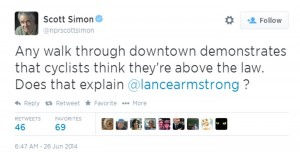A Response to "Why Bikes Make Smart People Say Dumb Things"
- Catie Willett
- Sep 21, 2016
- 3 min read
"Why Bikes Make Smart People Say Dumb Things" was a direct response to Scott Simon's tweet that read:

This article's main point - unlike my last post that referred to an article from the Washington Post describing Simon's argument as lacking importance - is about whether or not Simon's tweet is true or false.
This article clearly articulates the notion that Simon's tweet was dangerously "stupid" and wrong.
One of the first points made by the author is that Simon's argument lacks valid data. Seeing three cyclists run a red light does not mean all cyclists ignore the rules or believe themselves to be "above the law." Overgeneralization is often a problem in reporting, which brought the author to his next point: Simon should have known better.
I believe all celebrities, of any sort, are held to this standard. "They should have known better than to post that on social media!" is often read and heard from gossip magazines and individuals judging those in the public spotlight. But this expression holds even more importance to those in politics, broadcasting, and "royal" positions. The author of this piece agrees and notes that Simon should have known better because he is an "experienced reporter with a sterling reputation for fairness, he's one of the last people you'd expect to engage in this sort of stereotyping." Which, in his position as a reporter, I would agree because we hold certain individuals to a higher standard, believing Simon, in particular, to be an unbiased and news centered individual who understands what he says can have consequences. This sort of tweet is more likely to come from a reality TV celeb who typically post nonsense online in order to be remembered.
Nevertheless, the author's primary point of referencing Simon's tweet was to prove his argument was wrong, and I would argue that he articulates this point very well. He mentions a few points:
Compared to the 59,925 pedestrians killed by motor vehicles between 1999 and 2009, bicyclists killed 63 in the same time period.
Rolling through stop signs is statistically linked more to human error than cyclists. Cyclists break as many laws as drivers, just different laws.
People don't like change, those who are not accustomed to seeing bikes on the road dislike what they don't understand or are not accustomed to seeing.
These three points the author makes are truly what stands out to me. The statistics are clear that cars kill more people (and cyclists) than the number of cyclists that kill people. Although this is a utilitarian view, it should matter to the public because it articulates that people are at less risk when cyclists are on the road than when drivers are on the road. I truly believe the disdain felt by pedestrians toward cyclists sprouts from the author's last point: that what we do not understand is therefore scary and concerning.
However, I am not blaming the pedestrians. Being a pedestrian is scary, you have so much to look out for: cars, trucks, animals, trash on the road, other people, the list goes on. Your head has to constantly be on a swivel and adding bikes into the mix just seems to make people go overboard. But I think it is often only looked through this one side, that it's hard to be a pedestrian. But it's also hard to be a bicyclist. There needs to be a constant understanding that both can be difficult, and that is not entirely the cyclists or the pedestrians fault.
Like the author suggests, this problem can be overcome with a conversation. Both pedestrians and bikers are concerned about cars, why don't they work together to create a safer environment for both then? There is mutual fear, but they are directing it in the wrong places.
The relationship between bikers and pedestrians can be mended. This may only come about from conversation and change in how we maneuver the roads and decrease a person's risk of injury as a result of transportation.
Comentários